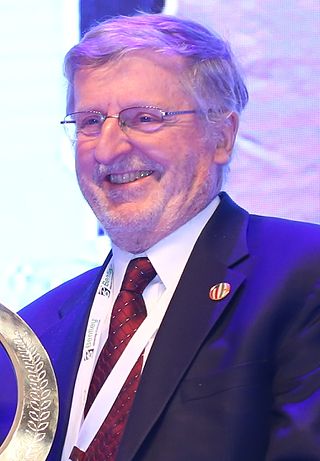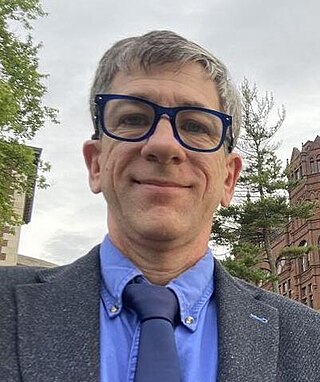
A geographic information system (GIS) consists of integrated computer hardware and software that store, manage, analyze, edit, output, and visualize geographic data. Much of this often happens within a spatial database, however, this is not essential to meet the definition of a GIS. In a broader sense, one may consider such a system also to include human users and support staff, procedures and workflows, the body of knowledge of relevant concepts and methods, and institutional organizations.

Anglia Ruskin University (ARU) is a public university in East Anglia, United Kingdom. Its origins are in the Cambridge School of Art (CSA), founded by William John Beamont, a Fellow of Trinity College at University of Cambridge, in 1858. It became a university in 1992, and was renamed after John Ruskin, the Oxford University professor and author, in 2005. Ruskin gave the inauguration speech of the Cambridge School of Art in 1858. It is one of the "post-1992 universities". The motto of the university is in Latin Excellentia per societatem, in English Excellence through partnership. Anglia Ruskin University was named University of the Year 2023 by Times Higher Education.

The University of East Anglia (UEA) is a public research university in Norwich, England. Established in 1963 on a 320-acre (130-hectare) campus west of the city centre, the university has four faculties and twenty-six schools of study. It is one of five BBSRC funded research campuses with forty businesses, four independent research institutes and a teaching hospital on site.
The Canada Geographic Information System (CGIS) was an early geographic information system (GIS) developed for the Government of Canada beginning in the early 1960s. CGIS was used to store geospatial data for the Canada Land Inventory and assisted in the development of regulatory procedures for land-use management and resource monitoring in Canada.

Michael Frank Goodchild is a British-American geographer. He is an Emeritus Professor of Geography at the University of California, Santa Barbara. After nineteen years at the University of Western Ontario, including three years as chair, he moved to Santa Barbara in 1988, as part of the establishment of the National Center for Geographic Information and Analysis, which he directed for over 20 years. In 2008, he founded the UCSB Center for Spatial Studies.
Georeferencing or georegistration is a type of coordinate transformation that binds a digital raster image or vector database that represents a geographic space to a spatial reference system, thus locating the digital data in the real world. It is thus the geographic form of image registration. The term can refer to the mathematical formulas used to perform the transformation, the metadata stored alongside or within the image file to specify the transformation, or the process of manually or automatically aligning the image to the real world to create such metadata. The most common result is that the image can be visually and analytically integrated with other geographic data in geographic information systems and remote sensing software.

Dame Shirley Anne Pearce is a British academic and psychologist. She is Chair of Court and Council at the London School of Economics and Political Science and a member of the Higher Education Quality Assurance Panel for the Ministry of Education (Singapore).
Map algebra is an algebra for manipulating geographic data, primarily fields. Developed by Dr. Dana Tomlin and others in the late 1970s, it is a set of primitive operations in a geographic information system (GIS) which allows one or more raster layers ("maps") of similar dimensions to produce a new raster layer (map) using mathematical or other operations such as addition, subtraction etc.
David William Rhind is a British geographer and expert on geographic information systems (GIS). He was Vice-Chancellor of City University, London, until July 2007.
Sir Ronald Urwick Cooke, FRGS DL is a professor of geography and geomorphology who was vice-Chancellor of the University of York from 1993 to 2002.
Launched in 2000, Esri's Education User Conference (EdUC), is organized and hosted by Esri's Educational Programs Team the weekend before the annual Esri International User Conference. Held in San Diego, California, during the month of July, the mission of the EdUC is to support and promote the use of geographic information systems (GIS) in educational research, instruction, administration, and policy. Over the years, it has grown into a sizable and popular event for those involved in using and teaching GIS in the greater educational community. This includes school teachers, youth program leaders, college and university instructors, community leaders, librarians, museum professionals, and administrators of educational institutions. The conference includes user presentation sessions, hands-on training workshops, exhibits, special interest group meetings, and a plenary session including a keynote presentation.
GIS in environmental contamination is the use of GIS software in mapping out the contaminants in soil and water using the spatial interpolation tools from GIS. Spatial interpolation allows for more efficient approach to remediation and monitoring of soil and water contaminants. Soil and water contamination by metals and other contaminants have become a major environmental problem after the industrialization across many parts of the world. As a result, environmental agencies are placed in charge in remediating, monitoring, and mitigating the soil contamination sites. GIS is used to monitor the sites for metal contaminants in the soil, and based on the GIS analysis, highest risk sites are identified in which majority of the remediation and monitoring takes place.
The National Center for Geographic Information and Analysis (NCGIA) was founded in 1988 and hosted at three member campuses: The University of California, Santa Barbara; the State University of New York at Buffalo; and the University of Maine.

Professor Susan Lea is a chartered psychologist and academic, and was Vice-Chancellor at the University of Hull from 2017 to 2022. Previously she was Deputy Vice-Chancellor (Academic) at the University of Greenwich.
David John Richardson is a British academic who was formerly the Vice-Chancellor of the University of East Anglia. As a result of the financial crisis that engulfed the university in early 2023, under his management, he resigned from the position on 27 February 2023, effective immediately, with Deputy Vice-Chancellor and Provost Christine Bovis-Cnossen taking over as acting Vice-Chancellor.

The Eastern Academic Research Consortium, or "Eastern Arc", is a regional research collaboration between the University of East Anglia, the University of Essex, and the University of Kent. The three partner institutions are all part of the "plate glass universities" established in the 1960s.

Joseph Kerski is a geographer with a focus on the use of Geographic Information Systems (GIS) in education.
April Mary Scott McMahon is a British academic administrator and linguist, who is Vice President for Teaching, Learning and Students at the University of Manchester.
David Michael Baker, is a British academic, musician and writer specialising in the field of library & information science (LIS). He holds an Emeritus Chair in Strategic Information Management from Plymouth Marjon University, where he was formerly principal. He has held a number of academic posts and has written widely in the fields of LIS and musicology.







